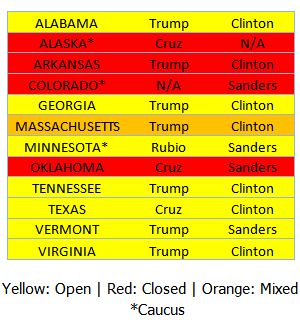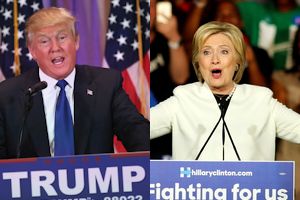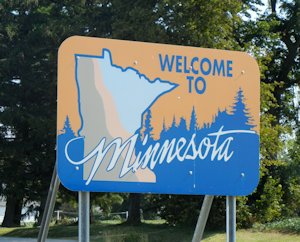Are Open Primaries Biased?
 | | It's kind of like Fat Tuesday, only with even more drinking |
Last night was Super Tuesday, and today, the political pundits and candidates are busy spinning the results of the primaries and caucuses to decide how and where this presidential election cycle is going. For the Democrats and Republicans, this is a story of a single front-runner being hounded by competition that refuses to give up. The Democrats have their so-called "establishment" candidate in Hillary Clinton, who is being chased in the polls by independent Bernie Sanders, a candidate with little establishment support but vocal and enthusiastic support from the grassroots. The Republicans, meanwhile, don't really have any "establishment" candidates left, with two tea party senators fighting to dethrone real estate mogul Donald Trump from the top spot on the ticket. Trump seems to have the most rabid and vocal fanbase, but is strongly opposed by a large proportion of the Republican base and Congressional leadership, who can't seem to decide who they'd rather support instead.
This is a perfect mixture for examining how the primary process can be affected by outsiders or independents as opposed to registered party affiliates. This is because every state handles the process a little differently, and it can be roughly divided into two categories: closed and open. In a closed system, only people who are registered with a political party may vote for that party's nominee, and in an open system, one's political party affiliation--if any--is irrelevant, meaning that one can vote for a Republican candidate or a Democratic candidate even if they are not card-carrying members of those parties.
 | | Behold my amazing Microsoft Excel and Word skillz! |
In regards to yesterday's elections, there were two closed primaries, six open primaries, one primary that wasn't exactly closed or open (Massachusetts), and three caucuses (where candidates are picked in forums rather than voting booths). To get a feel for whether or not the nature of the process had any real impact on yesterday's results, let's start with the two closed primaries: Arkansas and Oklahoma.
At first glace, Arkansas is unremarkable. In both the Democratic and Republican primaries, the front-runner won last night. On the left side, Hillary Clinton smashed Bernie Sanders by more than two to one. However, we must remember that Arkansas is former president Bill Clinton's home state, and many consider it Hillary's as well (though, technically, she was born in Illinois). As we will see, there is a definite home field advantage in these primaries, and that makes this particular result relatively meaningless. Therefore, when looking at Arkansas, perhaps the right side will be more useful. There, Trump's victory was surprisingly narrow: 32.7% to Ted Cruz's 30.5% as of this writing, with 96% of precincts reporting. It's certainly plausible, given the fact that most of Trump's major victories in the open primaries have much wider margins, that the closed nature of the Arkansas primary gave Cruz a boost, though not enough to put him over the top.
How about Oklahoma, then? Here, the results are far more interesting. With 100% of precincts reporting, Ted Cruz won the Republican side by an over six point margin, and Bernie Sanders won the Democrat side by a comfortable ten points. If Republican insiders are less likely to support Trump than outsiders (as is the wider narrative), then Trump's failure to finish first makes sense. On the other hand, Sanders is considered the outsider candidate on the left, whereas Clinton is seen as the safer bet. Perhaps this can be explained by pointing out that Clinton and Trump are seen as more moderate candidates, meaning that the extremes are more favored in Oklahoma's closed primary.
As post-game analysis, though, this is hardly convincing evidence. The sample sizes are just too small and my conclusions smell a bit like special pleading. Therefore, let's look at the open primaries, which are more numerous.
 | | I'm trying to be objective, but this is just a depressing image |
Here, the results are almost unanimous. Both Clinton and Trump won five states, with Cruz and Sanders only managing to win a single victory in their home states of Texas and Vermont, respectively. If there is a bias towards the front-runners in open primaries, these results are predictable, but it raises the question: why is there a bias towards Donald Trump and Hillary Clinton in open primaries versus closed primaries? Before I jump to any firm conclusions, let's check the results of the other contests first, just to see if there's anything to learn there.
Massachusetts is an oddity in that it is a closed primary for people registered to a party, but an open primary for independents and unaffiliated voters. Clinton and Trump both won Massachusetts, but Clinton's victory was incredibly narrow (a point and a half with 99% reporting). Trump's victory, though, was unambiguous; in Massachusetts, he nearly won half of all the votes. Interestingly, his biggest competitors (with only 18% each) were Rubio and Kasich, not Cruz. One popular theory about open primaries is that members of one party will intentionally vote in the opposing party's primary for a candidate they think will lose. Since Massachusetts' set-up seems designed to fight this possibility, one could argue that, on the Republican side, it is the independents who are voting in droves for the front-runner, not Democrats, but it would be difficult to make the opposite case on the Democrat side.
As for the caucuses, Alaska had a closed caucus for the Republicans on Super Tuesday, in which Cruz won narrowly, and Colorado had a closed caucus for the Democrats, in which Sanders won big by nearly twenty points. Both of these seem to support the idea that the less moderate candidates are favored in a closed process. However, the final Super Tuesday state, Minnesota, throws it all out the window. On the right, Marco Rubio handily defeated both Trump and Cruz, and on the left, Sanders again won an enormous victory against Clinton. There is no way to argue that an open process helped the front-runners in the Minnesota caucuses.
 | | Minnesota is... different |
But, in general, is there a bias to be found in open primaries? I think the evidence, despite being sloppy and full of exceptions, does point in that direction. It's impossible to ignore how the front-runners cleaned up in the open primary states. If their competitors hadn't had home states in that list, it is likely Clinton and Trump would have won them all.
The idea behind open primaries is that everyone gets a voice in selecting our eventual nominees, and it makes sense that the more moderate candidates would win them. But here's an alternative explanation: what if it's all about name recognition, not policy? Outside the beltway, almost everybody knows who Clinton and Trump are, but far fewer know anything about Bernie Sanders, Ted Cruz, and Marco Rubio. People who follow politics closely are more likely to be registered to a political party, and thus closed primaries would favor people who know more about the candidates than the general public. Perhaps Clinton and Trump are getting all the attention of independents and unaffiliated voters simply because they are getting all the media attention and benefit from incredibly high name recognition.
In the final analysis, one Super Tuesday isn't enough to come to any broad conclusions. However, I believe yesterday provides plenty of evidence that the process of a primary has a dramatic effect on the results. Perhaps I'll revisit this topic in the future, when my sample sizes are much bigger.
-e. magill 3/2/2016
|
|